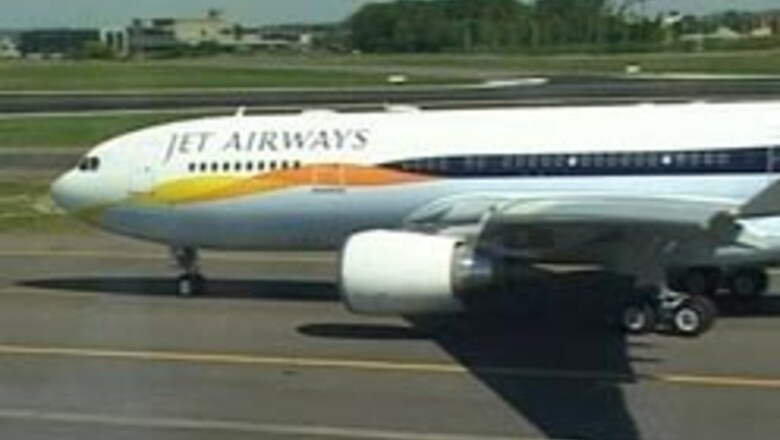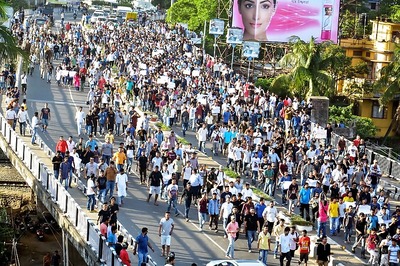
views
Us and them. No, this is not a plug for the Pink Floyd song. This is the great divide that Jet Airways chairman Naresh Goyal is dealing with, as he struggles to keep his airline afloat in these turbulent times. Matters in the company are taking a turn for the worse as the management is unable to push through a salary cut (up to 25 per cent), with the unions refusing to even have a discussion unless expat employees are eased out.
It’s not just the arithmetic of Jet’s negotiations with its employees on salary cuts that is tricky. Goyal’s top negotiation team, including the newest entrant, Ravi Chaturvedi—who has joined the airline from Proctor & Gamble in the US—has to parley with dozens of formal and informal representatives of its employees. The most aggressive and organised among them is SWIP (Society for Welfare of Indian Pilots), which has categorically refused to discuss pay cuts as long as foreign pilots are still in the picture. The foreigners have three year, fixed-pay contracts, and hence will not take on any of the pain.
Former Indian Airlines chairman and managing director, Air Marshal (retd) S Ramdas, has another take on the issue. He says the foreign pilots are insurance against the Indian pilots holding the airline management to ransom. “You can’t have one category of employees blackmailing the company. Pilots think they run the company, they don’t. They just fly the machines,” he says. Air Marshal Ramdas had his own run-in with pilot unions at Indian Airlines in 1991, when he took a hard line stopping transfers. When forced to rescind his decision by the then minister for civil aviation, Madhavrao Scindia, he chose to quit.
Experts point out that Jet Airways’ consolidation as a leading player in the Indian skies in the last decade-and-a-half, has owed a lot to smooth sailing on the personnel front. The private airline was able to attract the best talent from across the globe, and never faced the kind of labour problems that Indian Airlines and Air India had to deal with. However, now the lack of experience in dealing with issues like these is hitting Jet hard.
PAGE_BREAK
The Air Marshal’s point is borne out by Jet employees, who spoke to Network18 on the condition of anonymity. “About two years ago, the SWIP was getting very powerful and was able to push its way through on a range of issues related to pay, promotions, transfers and duty conditions. Its wings were clipped only when the management began recruiting foreign pilots by the dozen.”
In Jet Airways, expatriate employees—not only among the flying crew, but also across other functions like engineering, operations and commercial—are causing rancour. Largely from Singapore and Malaysian airlines and a slew of Middle-Eastern carriers, they have been brought in by Goyal in the hope of setting global standards for the airline that he wanted to make among the best in the world. Much of the workforce however still sees this as a racial preference for white skin.
If the swadeshi versus videshi debate was not enough, political parties like the MNS (Maharashtra Navnirman Sena) and the Shiv Sena are causing further problems for Jet. When hundreds of cabin crew took to the streets last month, the MNS took up their cause and forced Jet to hire them back. The Shiv Sena’s labour wing, the Bhartiya Kamgar Sena, has a strong presence in other domestic airlines like Air India.
The Aviation Employees Guild, which has a huge membership in the public sector airlines, too has entered the fray and held meetings to offer support to Jet cabin crew when they were sacked last month. Union leader V George, who heads the Aviation Guild in Air India, says it does not take much for a political party to muscle in. “With the support of just a few people, they can get in and put up a board and start operating like a union,” he says.
Not all agree that unionisation can save the airline. Dr R Krishna Murthy, director of the Mumbai-based Industrial Relations Institute of India, says the problems of the airline industry are more complex. Collective bargaining is most successful when an industry is doing well. The problems arise when businesses start making losses.
It is still not known how much relief salary cuts will give the airline or whether they will make a lasting impact on the airline’s fortunes. The entry of ‘collective bargaining’ certainly will.
Cuckoo Paul is Associate Editor with the new business magazine to be launched by Network18 in alliance with Forbes, USA


















Comments
0 comment